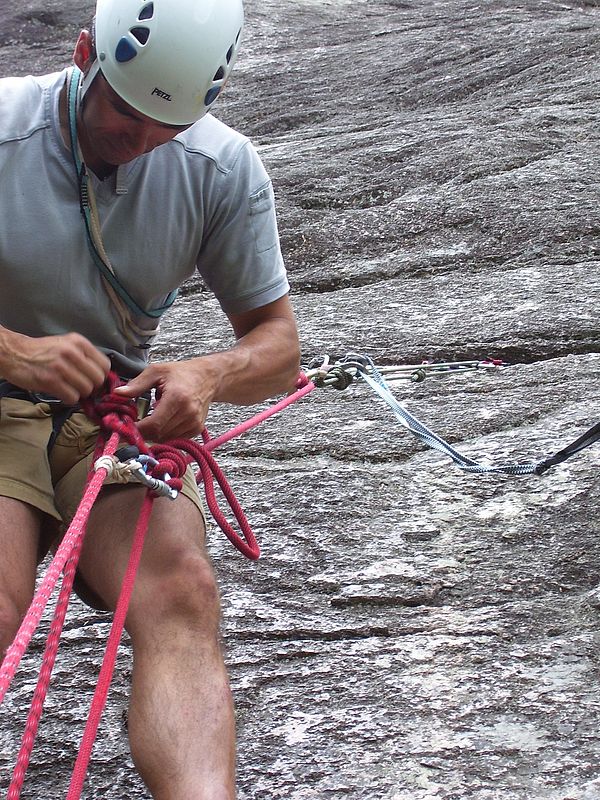Rock season is just around the corner and you’re probably psyched to just get out and climb. But before you tie-in and ascend, consider what you’d do if…
- Your partner took a whipper on the Whitney-Gilman Route and is hanging unconscious ten feet under her last piece…
- You need to lower your partner 400′ down Huntington Ravine as quickly as possible on your double ropes, but that means you need to pass a knot…
- Only two rappels left between you and the ground on the Adirondack’s remote Diagonal classic, but now your rope is stuck…
- Your second took a chunk of ice to the head on Twenty Below Zero at Lake Willoughby. You need to rappel down to administer first aid, then bring him up to the anchor to prepare to rappel to the ground…
Are you prepared to handle these scenarios? Any responsible climber should be. You should be. This workshop will help to get you there. There are books and YouTube videos galore that cover vertical rescue, but those resources shouldn’t be your sole source of knowledge. You need practical, field-tested, hands-on training with a variety of scenarios delivered by instructors with a depth of experience in the mountains, on the ice, and at the crags. During this two-day workshop we’ll tap into participants’ existing skills-set (please see requirements below) and create a rescue tool-kit focusing on simple, low-tech, timely solutions transferrable to the myriad rescue scenarios that climbing can present. This workshop is presented in partnership with Climb High—the Vermont-based source for quality climbing gear—and we’ll have a variety of vertical rescue items on hand for you to try out.
If you are a climber currently leading or multi-pitch climbing or planning to do so in the near future, you owe it to yourself, to your climbing partners, and to your loved ones to take this course. Connect with us for details!
Workshop Specifics:
- COST: $295--much cheaper than an outside rescue or the alternative (not being rescued at all). Advertisers always say "you're worth it" in order to sell something, but in this case it's the truth!
- Information about payment methods and policies can be found HERE.
- If you are only able to attend the Saturday session, contact us, as this may be possible (it will not be possible to only attend the Sunday session, as we will have covered a lot of vital info/skills on Saturday).
- Enrollment for this course is limited to 6 climbers (w/ 2 instructors), ensuring maximal learning.
- LOCATION: The workshop will take place at crags in the Bolton, VT area, about 20 minutes east of Burlington.
Participant Requirements:
- Basic competence with artificial gear placements (cams, stoppers, etc)
- Basic competence with anchor building using static line, cordelettes, and slings
- Competence with the following knots: figure 8 retrace (& on a bight), overhand (& on a bight), barrel, fisherman’s
- Competence with the following hitches: clove, munter, munter-mule
- Competence with the following friction hitches: kleimheist, autoblock, and prussik
- Prior experience with rappeling
Basic Rescue Rack (suggested gear—but we’ll have items on-hand)
- 1 Plaquette/Guide Device (Petzl Reverso 3 recommended)
- 1 Petzl Tibloc
- 6 locking carabiners (combination of Petzl Attache and Attache 3D recommended)
- 6 non-locking carabiners
- 4 shoulder length runners (nylon recommended)
- 2 double length runners (nylon recommended)
- 2 18′ 6-7mm cordelettes

